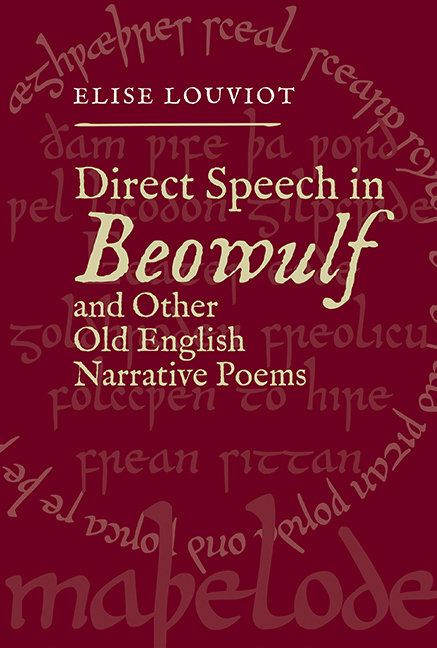Book contents
- Frontmatter
- Contents
- List of Figures
- Acknowledgements
- Introduction
- 1 The Form of Direct Speech
- 2 The Content and Context of Direct Speech
- 3 A Lack of Subjectivity?
- 4 Archetypal Subjectivity
- 5 A Problem with Voices
- 6 A Problem with Point of View
- 7 Impossible Irony
- Conclusion
- Bibliography
- Index
- Anglo-Saxon Studies
5 - A Problem with Voices
Published online by Cambridge University Press: 05 June 2016
- Frontmatter
- Contents
- List of Figures
- Acknowledgements
- Introduction
- 1 The Form of Direct Speech
- 2 The Content and Context of Direct Speech
- 3 A Lack of Subjectivity?
- 4 Archetypal Subjectivity
- 5 A Problem with Voices
- 6 A Problem with Point of View
- 7 Impossible Irony
- Conclusion
- Bibliography
- Index
- Anglo-Saxon Studies
Summary
The common confusion between Direct Speech and authentic speech has massive consequences for the interpretation of texts. One such consequence is the belief that it is natural for Direct Speech to serve the representation of voices distinct from the narrator's. In fact, nothing could be further from the truth. Certainly, in some textual traditions, it is conventional for the voices of individual characters to be sharply differentiated from each other and from the narrator's: the author may use recurring phrases or different registers and even different dialectal forms to give each voice its own unique identity. However, that possibility is merely one option among others.
A character is not an actual person; therefore their voice is not an actual voice. A text can attempt to create the illusion that the voice is real, but it can never be. A true voice is the expression of an intention, an emotion, a point of view, a capacity for action and, perhaps most importantly, a body. The composer of the poem has all that, but the character does not. The poet may, if they wish, create the illusion of all those attributes for their character, but they do not exist a priori. They are textual constructs and so is the character's voice.
Old English narrative poems, like many medieval texts, do not seem interested in attempting to create ‘convincing’ voices for their characters, which can be destabilising for a modern reader. This chapter examines both the modern bias for distinct voices and the handling of voices in Old English narrative poems.
Bakhtin and Dialogism
In Marxism and the Philosophy of Language, Bakhtin / Voloshinov writes several interesting chapters on Represented Speech, which he describes as ‘someone else's speech’. Bakhtin / Voloshinov is one of the first scholars to have taken an interest in the medieval representation of speeches. His approach is very interesting for at least two reasons. First, it is a Marxist approach, which means that he is not merely looking at Represented Speech from a formal or grammatical point of view, but that he is attempting to put the forms he observes in a broader social and historical context. Second, his interpretation is a very representative example of the modern bias for distinct voices.
- Type
- Chapter
- Information
- Direct Speech in Beowulf and Other Old English Narrative Poems , pp. 174 - 196Publisher: Boydell & BrewerPrint publication year: 2016



